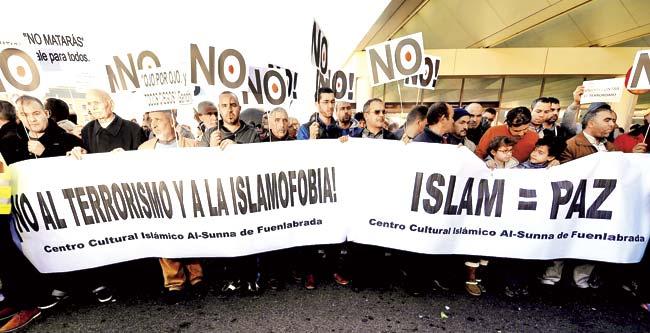How far does freedom of expression go? How important is the right to offend? And how sensitive must the offender be to the sentiments of his ‘victims’? The attack on the French satirical magazine Charlie Hebdo by Islamists supposedly “avenging” the Prophet Mohammed has gone through several phases in less than a week. And forced us to face, if not actually answer, some uncomfortable questions

 How far does freedom of expression go? How important is the right to offend? And how sensitive must the offender be to the sentiments of his ‘victims’? The attack on the French satirical magazine Charlie Hebdo by Islamists supposedly “avenging” the Prophet Mohammed has gone through several phases in less than a week. And forced us to face, if not actually answer, some uncomfortable questions.
How far does freedom of expression go? How important is the right to offend? And how sensitive must the offender be to the sentiments of his ‘victims’? The attack on the French satirical magazine Charlie Hebdo by Islamists supposedly “avenging” the Prophet Mohammed has gone through several phases in less than a week. And forced us to face, if not actually answer, some uncomfortable questions.
The most obvious and least questionable (if at all) is that execution, death, elimination are not the answers. Terrorists might have grievances. There might be historical, philosophical, psychological or religious reasons for their anger but there is no justification for killing someone because you disagree with their point of view.
ADVERTISEMENT

Muslims in Madrid, Spain hold up banners with messages such as ‘No to terrorism and to Islamophobia’ and ‘Islam = Peace’ during a show of solidarity following three days of bloodshed triggered by the attack on the French satirical weekly Charlie Hebdo on January 7. Pic/AFP
There. That’s set in stone. Unless you set your standards by any century before the 20th century. Or unless you are a totalitarian regime. Or unless you are a theocratic state. Or unless you are a dictatorship. Or unless you are democracy but you are fighting a war where liberties have to give way to authority. In the 1950s, communists and communist sympathisers were seen as enemies of the state by the United States of America, the beacon and the flag bearer for democracy everywhere.
We live our lives in contradiction. However painful that sounds to hear, or to say, or to write. The terrible atrocities committed on people of the African continent and on slaves from Africa in Europe and the United States brought home to the world the horror of attacking, insulting, limiting or confining people on the colour of their skin or their ethnic origin.
You cannot use your right to freedom of expression by insulting Jews for being Jewish. The history of 20th century Europe has seen anti-Semitism for what it is: a crime. But if you were to suggest that to blame all Muslims for the acts of terror of a few you would be immediately dismissed as a ‘Muslim apologist’. Events of the 21st century have made Muslims fair game and they must permanently cringe in apology. And yet any sensible Muslim realises that killing cartoonists and journalists for a perceived insult to their religion is unacceptable and condemnable.
But the burden does not lie on Muslims alone but on all of us. We cannot in India, for instance, justify the subjugation and segregation of those whom Hindusim has condemned as ‘lower’ castes or even worse, ‘untouchable’. Our good sense and our laws tell us that such discrimination is criminal in its thought process and in words as much as in its practice.
And as a woman, of any caste, creed, religion, race, ethnicity, community, you intrinsically understand discrimination and subjugation from the beginning of humankind. If I may rub it in, that’s 50 per cent of the human race.
But here’s the rub: can any of these sections of society take a joke, or satire, or any work of art, or fiction, or expression which does not fit in their idea of what is right? And does being politically correct or being culturally sensitive mean that humour – integral to human interaction – must be proscribed and constrained by government actions and laws and even death? North Korea did not like the idea of a Hollywood film which made fun of their little dictator and almost brought a giant movie studio to its knees. We laugh at North Korea for their antics but many people tell each other that if you laugh at nuts holding guns, you are asking for murder.
Were the 10 slaughtered journalists and cartoonists of Charlie Hebdo asking for death? Had they pushed the boundaries of free speech too much and too far? And here’s where our contradictions come round full circle. When it comes down to it, there has to be a better way than censorship by death or fear or law. Good taste cannot be legally dictated or assessed. Offence may be malicious or it may be misguided or it may be unintentional but the answer to that offence has to be by the same means or by legal action.
The problem here is the terrorists and the intolerant and the various sections of our global village which put their own personal or communal problems above those of the rest of us. It’s not the people who tell jokes or who push uncomfortable and distasteful buttons.
Ranjona Banerji is a senior journalist. You can follow her on twitter @ranjona
 Subscribe today by clicking the link and stay updated with the latest news!" Click here!
Subscribe today by clicking the link and stay updated with the latest news!" Click here!







